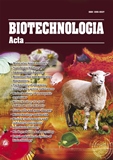ISSN 2410-7751 (Print)
ISSN 2410-776X (Online)

Biotechnologia Acta Т. 17, No. 2 , 2024
P. 84-86, Bibliography 67, Engl.
UDC:: 599.323.452:615.035.3]:577.15
DOI: https://doi.org/10.15407/biotech17.02.084
AGE-RELATED CHARACTERISTICS OF GLUTATHIONE-DEPENDENT ENZYMES FUNCTIONING IN RATS UNDER CONDITIONS OF TOXIC INJURY BY ACETAMINOPHEN
М.S. Ursatyi, H.P. Kopylchuk, I.M. Nykolaichuk
Yuriy Fedkovych Chernivtsi National University, Ukraine
Aim. The study is dedicated to evaluating the enzymatic activities of the glutathione system in liver cells of rats from different age groups under conditions of toxic injury caused by acetaminophen. The experiments used rats of two age categories: young (138–150 days) and mature age (348–360 days).
Methods. Acute toxic injury from acetaminophen was induced by administering it per os at a dose of 1250 mg/kg of animal body weight during the last two days of the experiment.
Results. Under conditions of simulated acute toxic injury by the medicinal xenobiotic acetaminophen in the livers of young and mature rats, a decrease was observed in glutathione-S-transferase, Se-dependent glutathione peroxidase, and glutathione reductase activities. A significant reduction in non-Se-glutathione peroxidase in liver cells is observed only in mature animals that were administered toxic doses of acetaminophen. The influence of the age component can be considered as one of the critically important factors in suppressing the functional activity of the glutathione-dependent enzymatic system, manifested by decreased activity of glutathione-S-transferase, non-Se-glutathione peroxidase, Se-dependent glutathione peroxidase, and glutathione reductase under conditions of toxic injury caused by the medicinal xenobiotic acetaminophen. A more pronounced decrease in glutathione-dependent enzymes under conditions of acetaminophen intoxication is observed in animals aged 360 days.
Conclusion. The consequence of the established changes could be the disruption of acetaminophen biotransformation in Phase II involving the glutathione system, which can be considered one of the risk factors for developing drug-induced hepatotoxicity in different age groups.
In the experiments, rats of two age categories were used: young (138–150 days) and mature age (348–360 days).
Mehods. Acute toxic injury from acetaminophen was induced by administering it per os at a dose of 1250 mg/kg of animal body weight during the last two days of the experiment.
Results. Under conditions of simulated acute toxic injury by the medicinal xenobiotic acetaminophen in the livers of young and mature rats, a decrease was observed in glutathione-S-transferase, Se-dependent glutathione peroxidase, and glutathione reductase activities. A significant decrease in non-Se-glutathione peroxidase in liver cells is observed only in mature animals that were administered toxic doses of acetaminophen. The influence of the age component can be considered as one of the critically important factors in suppressing the functional activity of the glutathione-dependent enzymatic system, manifested by decreased activity of glutathione-S-transferase, non-Se-glutathione peroxidase, Se-dependent glutathione peroxidase and glutathione reductase under conditions of toxic injury caused by the medicinal xenobiotic acetaminophen. A more pronounced decrease in glutathione-dependent enzymes under conditions of acetaminophen intoxication is observed in animals aged 360 days.
Cunclusion. The consequence of the established changes could be the disruption of acetaminophen biotransformation in Phase II involving the glutathione system, which can be considered as one of the risk factors for the development of drug-induced hepatotoxicity in different age groups.
Key words: glutathione transferase, glutathione peroxidase, glutathione reductase, liver, acetaminophen, different age groups.
© Palladin Institute of Biochemistry of National Academy of Sciences of Ukraine, 2024

